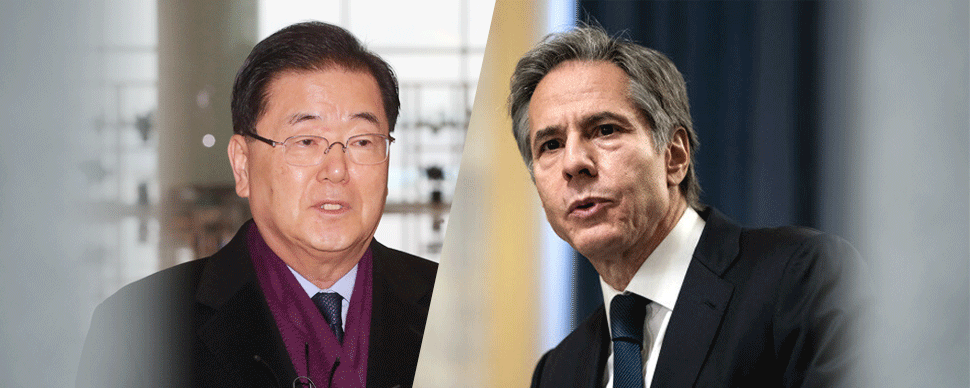Blingen Secretary of State
“Consultation with alliances such as North Korea’s nuclear policy Korea-Japan”

Graphics_Ko Yoongyeol
President Moon Jae-in picked up the’Ministry of Foreign Affairs Card’ with the inauguration of the Joe Biden administration on the 20th. It is interpreted with the intention of reappointing President Eui-yong Eui-yong (former head of the Blue House National Security Office), who initiated the operation of the “peace process on the Korean peninsula” in the spring of 2018, to resolve the problem of “coordination of North Korea policy” between Korea and the United States. Cheong Man-ho, chief of national communication at the Blue House, said, “I am the best expert who has devoted my entire life to the field of diplomacy and security. He served as head of the National Security Office of the Moon Jae-in government for three years, negotiating and coordinating all pending issues between Korea and the United States, and was deeply involved in major policies such as North Korea-US negotiations for the implementation of the peace process on the Korean Peninsula and the denuclearization of the Korean Peninsula.” Chief Chung also said, “Based on diplomatic expertise and insight, understanding and insight on policy, we will strengthen the ROK-US alliance with the inauguration of the US Biden administration and also have relations with major countries such as China, Japan, Russia and the European Union (EU). We will solve it smoothly.”

At the time of March 8, 2018, Eui-yong Eui-yong, head of the National Security Office of the Blue House (center), interviewed President Donald Trump at the White House and delivered news of the conclusion of the North Korea-US summit. The left is National Intelligence Service Director Seo Hoon at the time, and the right is Ambassador Cho Yun-je to the United States. Washington/AFP Yonhap News
As explained above, Candidate Chung confirmed North Korea’s commitment to the denuclearization of the Korean peninsula and North Korea-US dialogue through a 4-hour 12-minute interview with North Korean leader Kim Jong-un in Pyongyang on March 5, 2018, and then conveyed this fact to the United States. The first North Korea-US summit was held in Singapore on May 12th. Candidate Chung’s meeting with President Donald Trump on March 8th of that year is considered a’great scene’ of Korean diplomatic affairs when he announced the news of the North Korea-US summit in the darkened front yard of the White House. President Moon said at a New Year’s press conference on the 18th that he hopes that the new administration of North Korea and Biden will resume dialogue using the’Singapore Declaration’ agreed by the North Korean-U.S. leaders in 2018 as a starting point. In a sense, it can be said that it is a natural outcome to entrust the coordination of ROK-US policy toward North Korea. However, the task ahead of Candidate Jung seems to be challenging. Key figures in the U.S. diplomatic and security line, including Biden’s interlocutor (counter partner), Tony Blincoln’s nominee for Secretary of State, and Wendy Sherman’s nominee for the Secretary of State, have negative views on the Trump administration’s’top-down’ approach to North Korea. It has been revealed, and it does not appear to be positively evaluated for the’Singapore Declaration’ mentioned by President Moon.

Tony Blincoln Appointed US Secretary of State
In an interview with the US (CBS) last October, Mr. Blincoln pointed out that President Trump “exchanged a love letter with the world’s worst dictator and had three empty summits without preparation.” “We need to work closely with South Korea and Japan, demand that China strengthen its economic pressure and bring North Korea to the bargaining table.” It implied that the Trump administration would pursue a multilateral approach in cooperation with Korea, China, and Japan rather than the’top-down’ bilateral dialogue. At the Senate Foreign Relations Committee’s approval hearing on the 19th, Blincoln’s nominee, in consultation with allies such as Korea and Japan, revealed the basic principle that the United States will review options available to North Korea. “We can maximize US influence around the world by revitalizing key alliances,” he said in a speech at the hearing on the day. Together, we will take a much better position to counter the threats posed by Russia, Iran and North Korea and to defend democracy and human rights.” When asked whether North Korea supports a step-by-step approach of “relaxing sanctions” in exchange for “proven freeze” for nuclear programs, etc., the question was “We should review and plan to review the overall approach and policy toward North Korea. This is a difficult problem that has plagued successive administrations. This problem didn’t get better, it actually got worse. “We will look at what options we have, whether increasing pressure on North Korea would be effective in bringing it to the negotiating table, and whether other diplomatic plans are possible.” In the process, he also emphasized the principle of “We will begin by closely consulting with our allies and partners, especially Korea and Japan, and with the rest and reviewing all solicitations.” Regarding the issue of humanitarian aid to North Korea, however, “I think in North Korea, and in similar situations, we must be very careful about the people of that country and do what we can to alleviate their suffering. We want to make sure that we are paying attention not only to the security aspect of the equation, but also to the humanitarian aspect.” By Gil Yoon-hyung, staff reporter [email protected]
